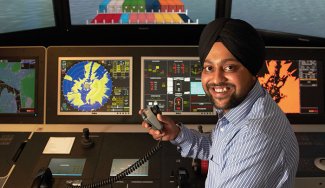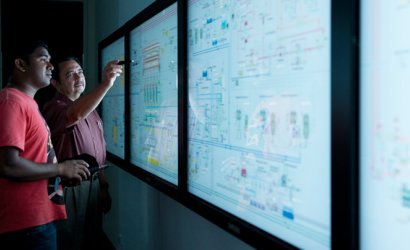

Why choose this course?
This maritime qualification prepares you for a career as a chief engineer. During your studies you will develop skills in fire prevention and firefighting, on board leadership and teamwork, vessel security procedures, personal safety and social responsibility, and survival craft and rescue boat operation. In addition, you will study pollution prevention, vessel compliance monitoring, maritime engineering calculations and operational mathematics and how to work in confined spaces.
This will allow you to work:
- as a chief engineer on vessels with inboard engines with propulsion power up to 3000 kilowatts within the exclusive economic zone (EEZ);
- as a chief engineer or second engineer on vessels with outboard engines with unlimited propulsion within the EEZ;
- as an assistant, under the direct supervision of the chief engineer; and
- in the engine room of a vessel up to 80 metres long with propulsion power up to 3000 kilowatts.
Career opportunities
- Marine Engineer
When choosing a course, it's important to think about the key skills and knowledge you'll need, as well as how you'll be assessed. Take a look at this information and consider if you might face any challenges in meeting the course expectations and requirements.
- good time management and the ability to work with tight deadlines
- ability to strictly follow workplace safety standards
- a keen eye for detail
- logical problem solving skills
- good communication skills
- a strong interest in boats, ships and maritime
-
An IELTS score (Academic) of 6.0 with no band score less than 6.0 or equivalent.
-
Equivalent to Australian Year 12.
-
Students must have 36 months of sea time to achieve AMSA certification requirements. Please refer to regulatory requirements licensing information listed under additional information.
-
Students must submit a comprehensive Resume outlining their work experiences, employment history and qualifications in order for the application to be assessed for entry into this course.
Legislative and regulatory requirements are applicable to this qualification. This qualification meets some of the requirements for certification by the Australian National regulatory body the Australian Maritime Safety Authority (AMSA) as an Engineer Class 3 Near Coastal as defined in Marine Order 505.
AMSA certification of competency will require:
- completing the MAR50120 Diploma of Marine Engineering - Engineer Class 3 Near Coastal
- holding or have held certificates of competency as defined in National Standards for Commercial Vessels (NSCV) Part D
- qualifying sea service as defined in the NSCV Part D
- meeting the medical and eyesight requirements specified in NSCV Part D
- having passed a final AMSA assessment
- meeting any other regulatory requirements as defined in the NSCV Part D.
There may be further semester intakes available for enrolment. You can view any further intakes when you submit your online application(opens in a new tab).
For information about pathways from TAFE to university, view our Pathways to university page.
How to apply
Apply to study at TAFE in six steps:
- find a course;
- check entry requirements;
- submit an application;
- accept your offer and pay;
- apply for your student visa; and
- receive your visa and come to Australia for your studies.
TIWA Course Guide
A guide to studying at TAFE in Western Australia, including study options, facilities and campus locations!
Download study area guide(opens in a new tab)
Contact us(opens in a new tab)
TAFE International Western Australia (TIWA) is the Registered Training Organisation (RTO) and Commonwealth Register of Institutions and Courses for Overseas Students (CRICOS) provider, for the delivery of training to international students, enrolled in a TAFE course in Western Australia. This nationally recognised course is delivered by a Western Australian TAFE college on TIWA's behalf. TIWA retains responsibility for the quality of the training and assessment delivered by the TAFE colleges and for the issue of certification documentation to students.


